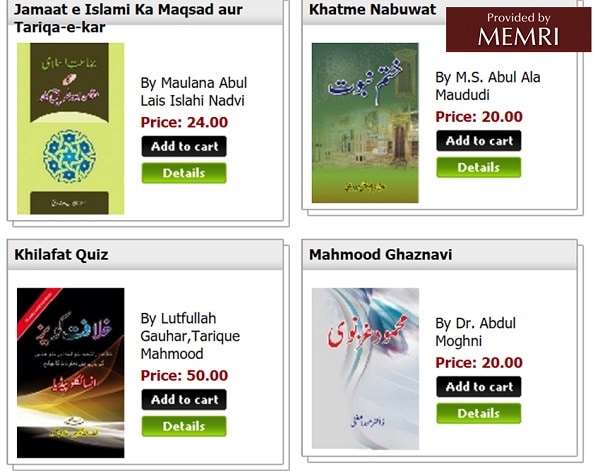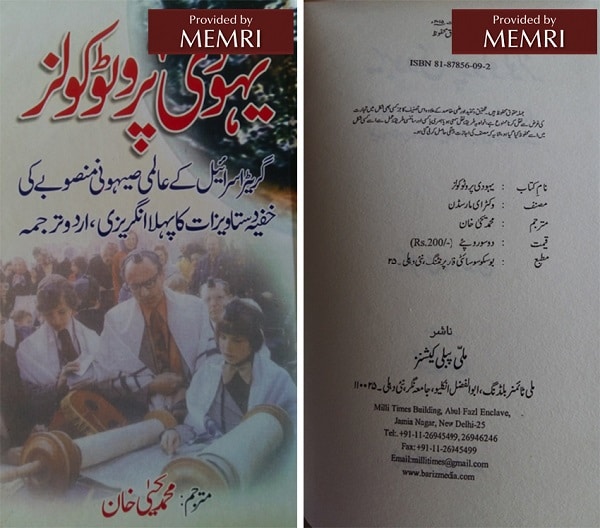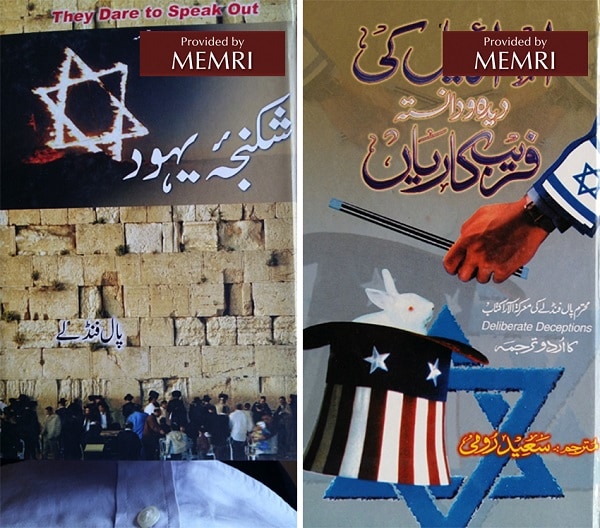While global attention is focused on the Pakistan-Afghanistan region as the breeding ground of South Asian jihad, it is actually New Delhi's Abul Fazl Enclave area that has emerged as the global clearinghouse of jihadi literature in Arabic, Urdu, English and Hindi.
Since 9/11, governments across the world have acted against the publication of jihadi books, magazines, and digital literature, but at the same time, a number of Islamist and jihadi publication houses have emerged in Abul Fazl Enclave, surviving right under the nose of the Indian security establishment. It may be that the jihadi literature published from Abul Fazl Enclave goes undetected because the Indian intelligence agencies have no Urdu-language expertise, or because the Urdu-language staff hired by them turn a blind eye to such literature. It appears that Islamist books written by radical Indian writers such as Rashid Shaz are also being published in Arabic from London.
Abul Fazl Enclave is part of Jamia Nagar, a predominantly Muslim region of New Delhi that is the seat of the Jamia Millia Islamia - a government-funded university attended predominantly by Muslims. In this region, Abul Fazl Enclave is the headquarters of Jamaat-e-Islami Hind (or Jamaat-e-Islami India). This is South Asia's largest Islamist organization, founded by Maulana Abul A'la Maududi (1903-1979). Maududi was a jihadi ideologue for South Asia, much like Hassan Al-Banna and Syed Qutub were jihadi ideologues for the Middle East and elsewhere. Due to the partition of the Indian Subcontinent in 1947 and the creation of Bangladesh in 1971, this religious network has the following organizationally unconnected branches: Jamaat-e-Islami Pakistan, Jamaat-e-Islami Bangladesh, Jamaat-e-Islami Hind, and Jamaat-e-Islami Jammu & Kashmir.
The Jamaat-e-Islami Hind - with its headquarters based in Abul Fazl Enclave - distinguishes itself organizationally from Jamaat-e-Islami Jammu & Kashmir, though all the branches of this religious organization founded by Maududi have the same ideological affiliation. In Pakistan, Bangladesh, or the Indian state of Jammu & Kashmir, the Jamaat-e-Islami branches have sheltered jihadis over the past two decades and more. In India's Jammu & Kashmir, Jamaat-e-Islami units even today continue to shelter jihadis infiltrating in from Pakistan. It is not surprising then that it is in Abul Fazl Enclave that a number of Islamist publication houses are regularly translating and publishing jihadi books in Urdu, as discussed below. These pro-jihad books are being supplied to Urdu-speaking audiences very cheaply, certainly below printing costs.
Books published from Abul Fazl Enclave are openly sold in many parts of India, including in Jammu & Kashmir state, where India has faced a serious jihadi threat sponsored from Pakistan. Shops in Srinagar, the capital of Jammu & Kashmir state, openly displayed such books. There is a global ideological pattern in the literature published from the printing presses based in Abul Fazl Enclave. These are outright translations into Urdu of Arabic-language jihadi books authored by Syed Qutb, Hasan Al-Banna, Abul A'la Maududi and others like them, or are written by Indian Muslim writers with the aim of cultivating Islamist viewpoints among Urdu-speaking audiences in India, and therefore also include books that foment hatred of Jews and Israel in furtherance of jihadi ideology among Indian Muslims, whose population is forecast to be larger than any Muslim country by 2050. These books published from Abul Fazl Enclave do not distinguish between criticizing Israel and hatred of Jews.
The Middle East Media Research Institute (MEMRI) is in possession of some of these books published by different printing presses based in Abul Fazl Enclave and other parts of Delhi. Given below are some examples of these books in MEMRI's possession, insofar as they shed some light on Abul Fazl Enclave's emergence as India's lead publishing center for jihadi books.

Left: Cover of book by Hassan Al-Banna, translated into Urdu as Mujahid
ki Azaan - The Call of the Mujahid" Right: Book's title page.

The website of Markazi Maktaba Islami Publishers, mmipublishers.net, shows
that it publishes mainly religious books in Urdu, English and Hindi.
A book written by Hassan Al-Banna (the founder of the Egyptian Muslim Brotherhood), translated into Urdu as Mujahid ki Azaan - "The Call of the Mujahid" - by Muhammad Inayatullah Subhani (see top left image above), is published by Markazi Maktaba Islami Publishers, whose address is: "D-207 Dawat Nagar, Abul Fazl Enclave, Jamia Nagar, New Delhi - 110025." The book is 376 pages. Its opening page starts with a quote from Hassan Al-Banna: "That Ummah which pledges to live, where is the question of its death? Even the death runs away from it." The book itself is a total radical blueprint for day-to-day living for ordinary Muslims, and covers all issues, social, religious, and political. Although the book is hardbound, it appears to be deliberately priced below the average cost of printing books in Delhi, at Rs 175.
The book's title page (see top right image above) shows that that this book is one of the publications of a fine-sounding nongovernmental organization called Human Welfare Trust. A search of the Markazi Maktaba Islami Publisher website, mmipublishers.net, shows that it publishes mainly religious books in Urdu, English and Hindi. An image grab of its website (see image above) shows that books published by it include books that promote hatred against Ahmadi Muslims such as those with the titles Khatme Nabuwat ("End of the Prophethood") or those that spread awareness about about invaders of India such as Mahmud Ghaznavi, or an encyclopedia on the caliphate with titles like "Khilafat Quiz," and more.

Left: Cover page of book titled Islami Nizam - Ek Fareeza, Ek Zaroorat
("Islamic System - A Duty, A Need") Right: Book's title page.
As seen on the left above, a book titled Islami Nizam - Ek Fareeza, Ek Zaroorat ("Islamic System - A Duty, A Need") is authored by the internationally known Sunni cleric Sheikh Yousef Al-Qaradhawi, who heads the International Union of Muslim Scholars. The translator's name is given as Muhammad Tufail Ansari. The book is published by Manshurat Publishers and Distributors.
The image on the right above shows that Manshurat Publishers and Distributors is based in Abul Fazl Enclave, with the address D-301 Dawat Nagar, Abul Fazl Enclave, New Delhi - 110025. A note on this page indicates that the book in Urdu was originally published by Lahore-based publisher: Al-Badr Publishers. The word "Al-Badr" refers to the first Islamic war fought by the Prophet Muhammad. The book itself inculcates a radical view of Islam, addressing religious, political and social issues for Muslims.
The publisher has a website: Manshurat.in. On its "About Us" page, the publisher declares: "Inspired by our Islamic faith, Manshurat is committed to serving Muslim communities worldwide by publishing innovative, relevant and authentic books. In today's ever changing world, Manshurat seeks to enable Muslim spiritual, cultural, intellectual and creative expression in ways that are engaged and exciting, traditional and modern."

January 10, 2016 post on Manshurat Publishers Facebook
page
This publisher imports a huge number of books from Pakistan, as attested to by a series of posts on its Facebook page. On January 10, 2016, a Facebook post on its page urged its followers to visit its stall at the Delhi Book Fair for books "imported from Pakistan" (see image above). It is interesting that India-Pakistan relations are conflicted but Indian Islamic publishers are able to import radical and fundamentalist literature from Pakistan.
Its website, Manshurat.in, shows a number of titles that are conducive to attracting young Indian Muslims to the cause of global jihad. Some titles available on its website (see below) are: Guantanamo Mein Paanch Saal - "Five years in Guantanamo"; Hassan Al-Banna Shaheed - "Hassan Al-Banna Martyr"; Asr-e-Haazir ki Mujahid Khwateen - "Mujahid Women of Modern Times"; and others. The website sells books like Islam Ki Awaaz - Syed Qutb Shaheed - "Islam's Voice - Syed Qutb Martyr." The Egyptian jihad theoretician Syed Qutb is lauded by jihadists as the fountainhead of global jihad in modern times.

Titles available at Manshurat.in
It appears that the publishing houses based in Abul Fazl Enclave, like Islamic organizations worldwide, both peaceful and non-peaceful, engage in fomenting hatred of Jews and Israel, without distinguishing between them. A book (on left below) by Victor E. Marsden on The Protocols of the Elders of Zion, translated by Muhamad Yahya Khan into Urdu as Yehudi Protocols - Greater Israel Ke Aalami Saihooni Mansoobey Ki Khufiya Dastatwezaat Ka Pehla Angreezi, Urdu Tarjuma ("The Jewish Protocols - The First English-Urdu Translation of the Secret Documents of the International Zionist Plan for Greater Israel"), is published by the Abul Fazl Enclave-based Milli Publications. The title page (on right below) shows its address as Milli Publications, Milli Times Building, Abul Fazl Enclave, Jamia Nagar, New Delhi - 110025. The entire book is devoted to sowing the hatred of Jews among Indian Muslims. This is a bilingual book, printed in both English and Urdu.
Almost all the books published from Abul Fazl Enclave appear to heavily discounted. A number of Islamist organizations are based in this locality, Jamia Nagar, and are known to get money from Saudi Arabia and elsewhere in the Middle East. Although this book is hardbound and runs over 300 pages, it is priced at a paltry sum of 200 rupees, which appears to be very far below the actual cost of printing.
Yehudi Protocols - Greater Israel Ke Aalami Saihooni Mansoobey Ki Khufiya Dastatwezaat Ka Pehla Angreezi, Urdu Tarjuma ("The Jewish Protocols - The First English-Urdu Translation of the Secret Documents of the International Zionist Plan for Greater Israel"), is published by the Abul Fazl Enclave-based Milli Publications.

Milli Publications has also brought out an Urdu translation of They Dare to Speak Out by Paul Findley (left, below). The Urdu version is titled Shikanja-e-Yehud - "The Sinews of the Jews." The book is hardbound and runs over 450 pages, but is priced at only 250 rupees. Milli Publications has also published another book by Paul Findley into Urdu (right, below) titled Israel ki Deeda Danista Farebkariyan - "Israel's Deliberate Deceptions." It appears that the Milli Publications is the leading publisher of radical Islamic literature not only in Urdu but also in Arabic and English, including for books by Rashid Shaz, who is known for cultivating the jihadi mindset among Indian Muslims. Some books by Rashid Shaz are also published in Arabic by London-based Darul Hikmah Publications.

Books
by Paul Findley, published by Milli Publications
* Tufail Ahmad is Director of the MEMRI South Asia Studies Project.




